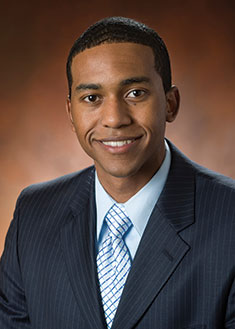Isaac Kinde ’05, biological sciences, has a habit of surrounding himself with the right people.
As a high school student in Redlands, Calif., he ranked at the top of his class, applying to the top national research universities. Then, as a Meyerhoff Scholar at UMBC, he collaborated with like-minded undergraduate researchers to examine the molecular makeup of HIV. Now, in his eighth year of an M.D./Ph.D. program at the Johns Hopkins University, he works alongside some of the nation’s leading cancer researchers in the Sidney Kimmel Comprehensive Cancer Center.
“I never had a master plan for my life,” Kinde says. “I just remember thinking that being around the right people would be helpful. And, I think that’s been the common thread.”
Named one of Forbes magazine’s “30 Under 30” rising stars this year, Kinde’s research has focused on developing effective screening tests for cancer – specifically colon, pancreatic, and ovarian and endometrial cancers. He created a preliminary technology that can detect ovarian and endometrial cancers in women who exhibit no symptoms of the diseases.
Using samples collected during annual exams, Kinde and his team use this new technology to sequence the DNA and distinguish any genetic mutations that are precursors to these types of cancer. Kinde’s findings are particularly exciting because—for the first time—researchers are detecting cancers based on specific DNA alterations. (Current screening tests, which are not recommended for general use due to their ineffectiveness, only study cancerous cells versus normal cells.)
Since Kinde began working in the Ludwig Center for Cancer Genetics & Therapeutics, which is part of the Kimmel Center, he has co-authored six articles in publications including Science Translational Medicine, Nature, and PLoS One. His advisor, Dr. Bert Vogelstein, director of the Ludwig Center and a professor of oncology and pathology, recalls being “immediately impressed with Isaac’s curiosity, earnestness, and intelligence.”
That strong first impression led Vogelstein to do something he admits that he rarely if ever does: reserve a space for Kinde in his laboratory, where the UMBC alumnus has joined the ranks of an ambitious group of researchers tackling some of the world’s biggest public-health issues.
Some of Kinde’s earliest exposures to medical research occurred in the laboratory of Michael Summers, a professor of chemistry and biochemistry at UMBC and a Howard Hughes Medical Institute investigator. Kinde worked with Summers on designing a new class of HIV inhibitors, examining a part of the virus that hadn’t been targeted before.
“I was close to working 40 hours a week [in the lab] and even more during the summer and winter breaks,” Kinde says. “And I just remember really loving what I was doing.”
In August, Kinde will begin the final stages of what will be a ten-year journey. He’s already completed the first two years of medical school and will now move through two-month rotations across a variety of departments such as medicine, surgery, and obstetrics and gynecology. After completing these required rotations (and finishing medical school), he’ll choose a specialty for his residency.
But Kinde says that UMBC – and the Meyerhoff Scholars Program in particular – have helped shape his remarkable trajectory.
“The Meyerhoff Program is one big family,” says Kinde. “It provides the mentorship you need and surrounds you with like-minded people who also want to succeed. And it has a proven track record of producing very successful people.”
Count Isaac Kinde as one of them – with even greater successes on the horizon.
– B. Rose Huber
Tags: Fall 2013

